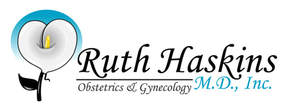A Preview of Our Prenatal Care
Welcome to the practice of Ruth Haskins, MD, Inc.! This preview is written to help you become familiar with our office, and to give you an overview of what to expect during the course of your prenatal care. At your very first visit, you will meet with either Dr. Ruth Haskins or our Nurse Practitioner, Jennifer Toth, to outline your prenatal care. Most of your questions and concerns will be addressed at this very important initial visit. We are sure this information will help you to have a happy and healthy pregnancy!
HOW TO REACH US:
At all hours, call 916.847.2649 for questions or concerns. The regular practice hours are Monday through Friday, from 8 AM to 5 PM. During this time, calls to this number will be answered by the staff of Ruth Haskins, MD, Inc. PLEASE DO NOT CALL TO REQUEST RESULTS OF LABS OR ULTRASOUNDS: THESE WILL BE DISCUSSED WITH YOU AT YOUR NEXT APPOINTMENT. On holidays, weekends and after-hours, your calls will be forwarded to the call service, and the doctor on call will call you back to answer emergency questions. We encourage you to use e-mail using our EMR Portal (Athena Portal) for minor concerns that can safely wait until the following work-day or for a request of prescription refills or to change your appointment time. IF YOU REALLY NEED TO TALK TO A DOCTOR AND ARE UNABLE TO REACH A HUMAN VOICE, PLEASE CALL LABOR AND DELIVERY AT 916.983.7440. A MEDICAL PROFESSIONAL WILL ALWAYS BE AVAILABLE TO ASSIST YOUR EMERGENCY NEEDS!
HOW TO REACH US:
At all hours, call 916.847.2649 for questions or concerns. The regular practice hours are Monday through Friday, from 8 AM to 5 PM. During this time, calls to this number will be answered by the staff of Ruth Haskins, MD, Inc. PLEASE DO NOT CALL TO REQUEST RESULTS OF LABS OR ULTRASOUNDS: THESE WILL BE DISCUSSED WITH YOU AT YOUR NEXT APPOINTMENT. On holidays, weekends and after-hours, your calls will be forwarded to the call service, and the doctor on call will call you back to answer emergency questions. We encourage you to use e-mail using our EMR Portal (Athena Portal) for minor concerns that can safely wait until the following work-day or for a request of prescription refills or to change your appointment time. IF YOU REALLY NEED TO TALK TO A DOCTOR AND ARE UNABLE TO REACH A HUMAN VOICE, PLEASE CALL LABOR AND DELIVERY AT 916.983.7440. A MEDICAL PROFESSIONAL WILL ALWAYS BE AVAILABLE TO ASSIST YOUR EMERGENCY NEEDS!
YOUR DUE DATE:
Your due date (we call it your “estimated date of confinement”, or “EDC”) is calculated by adding 40 weeks to the first day of your last menstrual period (“LMP”). A normal pregnancy lasts anywhere from 37 to 42 weeks. If menses have been irregular, then the due date is established by the earliest ultrasound exam of your pregnancy.
ROUTINE OBSTETRICAL LAB STUDIES:
Please have your initial bloodwork drawn promptly after your first OB appointment. It is important that YOU know which lab (Quest versus Lab Corps) your insurance would prefer for you to use for routine studies. The initial prenatal panel is a group of studies that helps us to identify conditions that cause risky pregnancies. Specifically, we test your blood type, blood count, and determine if you could have been exposed to infections such as Rubella, Hepatitis, Syphilis or HIV. We also include a test of your urine for bacteria. All test results (along with all your health records) are kept strictly confidential. Please let us know if there is any testing you wish to decline.
Around 28 weeks gestation you will be advised to have another set of screening blood tests. These include a test for anemia (blood count), a test for diabetes (the one hour glucose tolerance test) and, for women whose blood type is Rh negative, a test for abnormal antibodies (if absent, a RhoGam injection will be recommended).
Around 35 to 36 weeks gestation, a culture of the outside of the vaginal opening will be done looking for “Group B Strep”. This is a bacteria that many women carry in their genital tract (normally). We identify carriers so we can watch closely for possible transmission to babies at birth.
SPECIAL PRENATAL SCREENING EXAMS:
Most patients will have a limited ultrasound exam at the first obstetrical visit to the practice. Genetic screening tests are offered to all pregnant women to look for risk of genetic abnormalities. There are several options for these elective tests: they will be discussed at your first OB visit. Routinely a comprehensive ultrasound is offered to all pregnant women. This would be done between 19 and 22 weeks gestation, when full differentiation is complete. Other ultrasound exams may become medically necessary. “Entertainment scans” including “3D” and “4D” scans are available in the community for cash paying customers. These are not medically recommended.
SCHEDULE OF APPOINTMENTS:
“New Ob” appointment: This visit is your first visit to our practice. Your medical history will be reviewed and a preview of your future care will be presented. You will have a complete physical exam: This will include a brief ultrasound exam, to verify the health and dating of your pregnancy.
Subsequent obstetrical visits will be every 4 weeks until 28 weeks gestation. Visits thereafter occur closer together related to the risks identified with your pregnancy. All routine OB visits are scheduled for 15 minutes, but we will take all the time we need to answer your concerns every visit. The 36-week visit will include a check for cervical dilation and a review of your personal birth plan.
Visits will be alternated between Dr. Haskins and her Nurse Practitioner, Jennifer Toth (rhymes with both not moth). Jennifer might also see you if doctor is away from the office. We try to alternate your visits with both providers, so both know you well enough to answer your questions when you email them.
VACCINATIONS:
The flu vaccine is recommended to pregnant women during flu season: between September and June Pregnant women are more likely to get the flu and it much more severe and lasts longer in pregnancy. The vaccine has no preservative and is made up of inactivated flu particles – no illness in mom and no risk to baby. We believe all moms should be fully vaccinated against COVID (unless they can’t be). We encourage all pregnant women to receive the Tdap vaccine around 24 weeks gestation to develop antibodies against whooping cough that will cross the placenta and protect newborns from this potentially deadly illness until they can safely be vaccinated themselves (between 6 months to a year old).
PRENATAL SUPPLEMENTS:
A well balanced diet is essential to growing a healthy baby. If you eat poorly during pregnancy, you may have a smaller or less healthy baby and also may deplete your body’s store of nutrients. Healthy pregnant women who eat a well balanced diet do not need prenatal vitamins. However, some women definitely do need supplements: vegetarians, smokers, teenagers, women with twins, women with a history of drug abuse, women with a history of bariatric surgery, or women with a chronic disease of many sorts. Generally, we recommend that women use generic supplements: these are just as effective as prescription prenatal vitamins, and usually cost less.
Women who have low dairy intake should take a calcium supplement daily throughout pregnancy and while nursing. Your daily requirement is a total of 1200 to 1500 milligrams of Calcium. This can be found in dairy products and green leafy vegetables. Excess calcium intake can result in an increased risk of kidney stones, so don’t over-supplement.
NAUSEA:
Nausea is very common in early pregnancy. Some women continue throughout the entire pregnancy with it. Although it is often called “morning sickness”, it can occur at any time of the day or night. It usually subsides around 16 weeks gestation. Here are some tips to manage it:
- Eat frequent small bland meals through the day
- Avoid an empty stomach or eating too much at once
- Eat some dry cereal or crackers at bedtime and first thing in the morning
- Try to drink extra liquids between meals
- Avoid spicy or fatty foods
- Suck on flavorful hard candy or juice bars
- Try papaya enzymes (available at health food stores) after a good meal
- Try ginger snaps, ginger tea or ginger ale
- Try vitamin B6: 50 mg once, or up to 4 times per day.
- Try “sea-bands” which apply pressure at the inner wrist
- Consider one half a Unisom pill plus 25 or 50 mg Vitamin B6 (drowsiness common)
If your nausea is so severe that you cannot keep down even just clear liquids, or are feeling very light-headed or dizzy, please call the doctor so we can consider prescription medications, or even an admission for intravenous rehydration.
HEARTBURN:
Heartburn is very common in pregnancy, especially closer to the due date when the uterus compresses the bowels. Eat more slowly, eat smaller meals; avoid spicy, fried or fatty foods. You may take TUMS, Mylanta, or Maalox for relief. You may try Pepcid-AC for prevention.
NOSEBLEEDS:
More frequent nosebleeds are common in pregnancy due to increase in blood supply where there are abundant veins, like in the back of the nose. Apply pressure to the nostrils or apply ice-pack to the nasal area. Use a humidifier or salt-water nose sprays to keep the nostrils and sinuses moist during dry weather.
HEADACHES:
Headaches are very common in early pregnancy due to hormonal changes. Helpful hints: Lie down with a cold wet cloth or ice pack on your forehead, try to nap, try Tylenol (as directed on your bottle), eat frequent small meals (to keep your blood sugar from having radical swings), try to increase your fluid intake (dehydration makes headaches worse). For any persistent or severe headaches, especially when associated with nausea: contact the doctor without delay.
VAGINAL BLEEDING:
It is not normal to have vaginal bleeding in pregnancy. In early pregnancy, it might just represent a bit of bleeding of the cervix: don’t panic! This is quite frequent, and will go away within a couple days. While deciding whether or not it is a serious situation, avoid sexual relations or intense athletic activities. If the bleeding progresses, call the doctor. If it is mild in volume and stops within a couple days, it was just a false alarm. If this occurs to any extent after 20 weeks gestation, call the doctor. Even mild bleeding can be serious later in pregnancy.
LEG CRAMPS:
These are very common in pregnancy, especially closer to your due date. Stretching just before retiring can help a bit. Avoid any activity that causes you to ‘point your toes’ while snoozing. Be reassured that they are likely to resolve completely with delivery.
SWELLING:
Mild swelling of the hands and feet is very common, especially closer to the due date. Avoid excessive salt in your diet – this is most common in snack foods, fast foods and many ethnic foods. Avoid prolonged walking or standing: elevate your feet whenever possible. You will get temporary relief when submerged in a cool pool or tepid bath.
PHYSICAL ACTIVITY:
We encourage exercise during pregnancy. Staying active can help decrease discomforts of pregnancy. Avoid activities that carry a risk of injury like skiing, roller-skating, horseback riding or playing softball. Low impact aerobic exercises or ‘aqua aerobics’ are ideal. Avoid excessive heat, drink plenty of fluids, protect your vulnerable joints and lower back, avoid working hard to breathe, and keep your maximal pulse at exercise lower than twice your baseline pulse. Excessive exercise (like running marathons) is associated with abnormally small babies at birth.
TRAVEL DURING PREGNANCY:
Always wear your seat belt. Avoid excessive time cramped in any one position: get out/up and stretch your legs often. Flying in pressurized aircraft is very dry and can lead to contractions: we don’t recommend it if you are ill or after 28 weeks gestation, even when you are well. Traveling more than an hour away from the hospital is somewhat risky from 28 to 36 weeks gestation; it is strongly discouraged after 36 weeks gestation.
WEIGHT GAIN:
The healthiest babies are born to women who gain around 30 to 35 pounds in a pregnancy. You should try to limit weight gain to around 3 to 4 pounds each month. If you have had an eating disorder in the past, it is more likely to come back when you are pregnant: please let us know about this history.
UMBILICAL CORD BLOOD PRESERVATION:
Fetal cord blood can be collected after your baby is delivered, before your placenta is delivered, if you request it. This is something YOU would need to arrange with a private corporation well ahead of your delivery. Public donation (though lauded) is not available at Mercy Folsom Hospital.
MERCY FOLSOM HOSPITAL:
This is the only hospital to which Dr. Haskins admits and at which she delivers babies. If you develop a high risk pregnancy and care needs to be transferred to a hospital that has high risk OB specialists and a Neonatal Care Unit, you may be sent to Mercy San Juan Hospital or UC Davis Medical Center, depending on your insurance and their bedspace. Dr. Haskins does not have credentials at those facilities and so your care will be transferred to a specialist there.
Dr. Haskins makes herself available to her patients from 7am until 10PM. After 10pm there is an Obstetrician “in house” at Mercy Folsom Hospital who will care for your inpatient needs. If you MUST have a female provider only, please let us know far in advance and we will try very hard to accommodate your wishes.
BIRTH PLAN:
Having a “Birth Plan” is your right, but not your responsibility. We try very hard to give every woman a comfortable delivery that is everything she has dreamed of for at least 9 months, for some women a lifetime! We ask that you be flexible in your wishes and allow us to provide our expert care, in a background mutual sharing of information and trust. If there is something that must happen to make your day perfect, or something that could ruin your special day if it happened: PLEASE TELL US! We want to make your BIRTH DAY as perfect as your dreams!
THINGS TO AVOID IN PREGNANCY:
- Drugs: Check with your doctor before taking any medications. Do not use street drugs of any kind. If you have ever had a drug problem, let the doctor know this at your first visit: it’s very important. Avoid aspirin, ibuprofen, Motrin, Advil, Aleve, Pepto-Bismol and Alka-Seltzer.
- Alcohol: No safe amount of alcohol has been determined. We recommend that women don’t drink any alcohol in pregnancy.
- Smoking: Smoking in pregnancy is associated with low birth weights, premature birth, miscarriage and stillbirths. Children of smokers have more ear infections, asthma and ‘crib death’ (SIDS).
- Toxoplasmosis: This is a protozoan infection found in cat feces. Wash your hands carefully after handling cats. Have someone else change the litterbox whenever possible.
- Saunas and spas: Do not submerge in water temperature at or above 104 degrees. Drink plenty of water. If your skin turns pink or you can feel your heart racing, then your body is too warm for your unborn child.
- Predator fish: Avoid excessive shark, tuna or tile fish. These can have excess mercury.
- Undercooked Meat: Do not eat Sushi. Make sure all meat is well cooked. Avoid overly processed meats (like Deli lunch-meats) and soft cheeses. These can carry extra bacteria that can hurt your growing child.
- Avoid Contact With Sick Children: Especially children with unexplained rashes. Diseases such as Chicken Pox, Rubella or “Fifth’s Disease” (Parvovirus) can be dangerous to the unborn child in the rare instance where a mother is not already immune and also actually contracts the disease.
SAFE TO TAKE IN PREGNANCY:
It is OK to take Tylenol, Sudafed (after 12 weeks gestation, unless a woman has hypertension) or cough syrup (like Robitussin) to treat the symptoms of a head cold. Do not use nose sprays (except for simple salt water – “Ocean Spray Mist”). Get lots of rest and drink plenty of clear liquids. Avoid multi-symptom remedies such as Nyquil, Comtrex or Contact.
Consistent, quality, compassionate and informative care for women of all ages.



